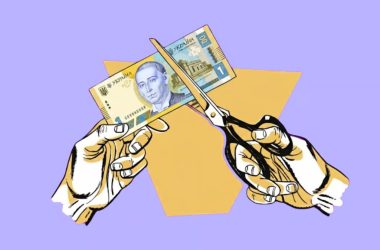According to the NBU survey, the mood of Ukrainian entrepreneurs is now the worst since the beginning of the year. UNIAN found out which sectors of the economy were under attack, and whether it is possible to fix it during the war, writes agronews.ua.
The National Bank of Ukraine measures the mood of entrepreneurs every month in order to obtain the “average temperature in the room” and to outline existing problems in the economy. The latest June report, published by the regulator at the beginning of July, shows that in the summer Ukrainian business was gripped by a real depression – the indicators are the worst in the last year and are closely approaching the most stressful 2022.
Moreover, bad moods are simultaneously observed in trade and construction and industry. And in the service industry, the indicators are literally the worst. What exactly hinders entrepreneurs now, and are there ways to overcome these problems, read on.
Bad mood
The war has been going on for the third year now, and businesses far from the front line remain active because they have been able to adapt. However, the closer to “zero”, the more difficult it is for large enterprises to work. For example, in Kharkiv, a large business is either idle, or evacuated, or operates in an extremely limited mode.
The Russians specifically fired missiles not only at plants and factories, but also at shopping malls, markets, and branches of Novaya Poshta – to provoke crises in local sales markets, in logistics, and panic among consumers. There was no panic, but nothing particularly good either.
The situation is similar in Sumy Oblast, Kherson Oblast and other frontline regions. It is easier – in Dnipro, Odesa and Kyiv. And all other countries, in general, suffer less from direct missile and drone strikes. But the mood in June collapsed there all the same – the dynamics are approximately the same in all regions.
Thus, the NBU writes that the Index of Expectations of Business Activity in June fell to 43.6 points. In May, the score was 48.0, which is also low, because it indicates that less than half of entrepreneurs had a positive attitude.
Maksym Samoiluk, an economist at the Center for Economic Strategy, believes that energy problems and a shortage of personnel are expected to be the key negative factors. But he insists that this NBU index, although important, is still a subjective indicator and does not take many factors into account.
“The index of expectations of business activity is an important subjective indicator of the state of the economy, which indicates a gradual recovery of economic activity or, on the contrary, a worsening of the situation. We now see that the expectations index has collapsed to 43.6 in June 2024. This is noticeably worse than at this time last year, says the economist. – Consequently, business expectations have become comparable to mid-2022, when a tense phase of war with unpredictable results continued.
That is, in 2024, Ukraine will experience the “second 2022” year. But why did expectations fall in the summer? After all, in this season, electricity consumption is reduced compared to winter, even taking into account air conditioners.
In fact, unlike household consumers, business does not have such a direct seasonal dependence. An entrepreneur needs to think about a continuous production process in any season. Even if “production” is sales or service. Everyone depends on a stable energy supply.
Services in “depression”
As the NBU reports in the report, the worst assessment of the situation in the summer is those entrepreneurs who are involved in the service sector. Their mood indicator “collapsed” from 47.2 in May to 39.7 in June. This is the worst performance in the industry in the last 12 months. And if the problems are all the same as those of other entrepreneurs, their priority is different.
Yes, this category of entrepreneurs complains the most not so much about power outages, but about the shortage of personnel. They call the outflow of qualified specialists in June the main reason for their “depression”.
Costs due to power outages (because equipment broken due to power surges must be repaired and new ones purchased) come second in this “rating” of problems. Businessmen called the decrease in population demand the third crisis factor
Moreover, entrepreneurs are already experiencing and predicting an even greater reduction in the number of orders against the background of an increase in purchase prices and tariffs. That is, everything came together – an increase in expenses against the background of a decrease in demand, which led to a decrease in business profitability. That’s why it’s negative.
It should also be taken into account that the service sector in our country is represented mainly by small and even micro-businesses, which have a much smaller margin of safety compared to medium-sized and especially large companies. Buying the same generator for a small fop will be a much more significant investment than for a medium-sized company.
“For the service sector, the availability of electricity is critically important, as it ensures the functioning of the necessary equipment in hairdressers, cafes, restaurants, beauty salons, swimming pools, fitness centers, cinemas, etc.,” says Oleksandr Chumak, president of the Association of Private Employers.
In addition, the representative of private employers assures that the service industry suffers the most in the frontline regions – in particular, in Kharkiv. According to his calculations, in June alone, the occupiers released 29 KABs of various power in the city
awns.
“For six months, the Kharkiv region is in the most critical conditions for doing business. The city of Kharkiv is shelled almost every day. Each shelling leads to the loss of business by 10 to 50 small or medium-sized entrepreneurs, Oleksandr Chumak continues. – Small shops, coffee shops, offices, MAFs, shopping centers, medical centers… Each arrival means spending 3-10 thousand dollars to restore business.”
However, according to the specialist, although with a bad mood, many entrepreneurs continue to work in Kharkiv and repair everything mainly at their own expense. At least those who still “have faith in the future”, as he says. And there are still many of them.
By industry – who else is in a bad mood
In its report, the National Bank touches not only on the service sector, but also on such sectors as trade, industry and construction. Let’s start with trade, because these are both IAFs and shopping centers at the same time – that is, both small and large enterprises. Perhaps due to such diversity, the mood index in this area is not as depressing as in the service industry – 46.4 points. In May it was 47.7. The difference is minimal, but the dynamics are also negative.
It is interesting that trade as a sphere of the economy shows the best mood in the country. Much higher than the average 43 points in all branches. However, this is “at the moment” – in June. And the forecasts here are not very optimistic. Sellers (both small and large) expect a further decrease in turnover, and also record a decrease in their own stock of goods, which indicates an expectation of a decrease in demand in the future.
Separately, they note the decrease in profit as a problem, since the purchase price of goods is increasing, and the purchasing power of Ukrainians is decreasing. Also, at the top of the industry’s problems are not only power outages, but also tariff increases.
Unsurprisingly, the second is the industrial sector, where sentiment also fell, but only to 45.5 (in May, the NBU recorded 48.8). Like traders, industrialists complain about power outages, rising production costs and staffing problems. But in the first place for them are security threats, which is not surprising, because the Russian Federation specifically “hunts” for operating industries.
Another important factor mentioned by industrialists is the external environment. They expect a decline in export orders. Against this background, the stocks of already manufactured products, which have begun to be bought less abroad, are growing. In addition, entrepreneurs complain about the decrease in stocks of raw materials and materials, the increase in their prices, and the increase in the percentage of unfulfilled orders, which can be related to all the problems listed above.
Nevertheless, we see that the industry, as a whole, has adapted to the new conditions. Therefore, the mood there is not as panicky as in 2022. The situation is somewhat similar among construction workers, where sentiment also worsened, but did not collapse to the level of the service sector. Ratings here fell from 49.8 points in May to 43.0 points in June. In January 2024, it was 31.9. This shows that sentiment among builders has worsened, but is still significantly higher than at the start of the year.
For such enterprises, the main problem was not tariffs or security issues, but extremely weak investment demand (although slightly higher than in January 2024 or 2022). Also, among the reasons that worsen the mood, builders note a decrease in the volume of new orders and, accordingly, the volume of construction in general.
There are reasons to worry about the availability and prices of raw materials and about the prices of finished products (which will decrease, probably due to a decrease in demand and solvency of Ukrainians). Plus the staffing issues, blackouts, and security risks that exist in every other industry.
But there are also positive developments – builders believe that although the prices for the services of contractors will increase, they themselves will be more affordable for orders. We are talking here not only about other Ukrainian companies, but also about Turkish ones, for example, which are now gradually increasing their influence on the domestic market of construction services.
Can the situation be corrected?
Summarizing the report of the National Bank, it can be noted that in industries where the share of medium and large businesses is greater, entrepreneurs show a better mood. Because it is easier for a large business to prepare for problems with electricity supply, and it is easier to book valuable specialists for mobilization.
But big companies are facing increasing security threats. However, compared to 2022 and even the beginning of 2024, the security situation has improved significantly.
The NBU survey nicely reflects not only the list of problems that concern business, but also their priority for each industry. Somewhere in the first place are electricity tariffs or a shortage of personnel, and somewhere the drop in demand abroad and the same security issues. Nevertheless, so far only the service sector has indicators at the level of the crisis year 2022. Is this a trend or just a temporary phenomenon – we will see in the next NBU report.
“Economic activity requires: electricity, water, sewage, heating, roads (logistics) and communication. In the absence or limitation of energy supply, a large part of these components is missing, says Oleksandr Chumak, president of the Association of Private Employers








